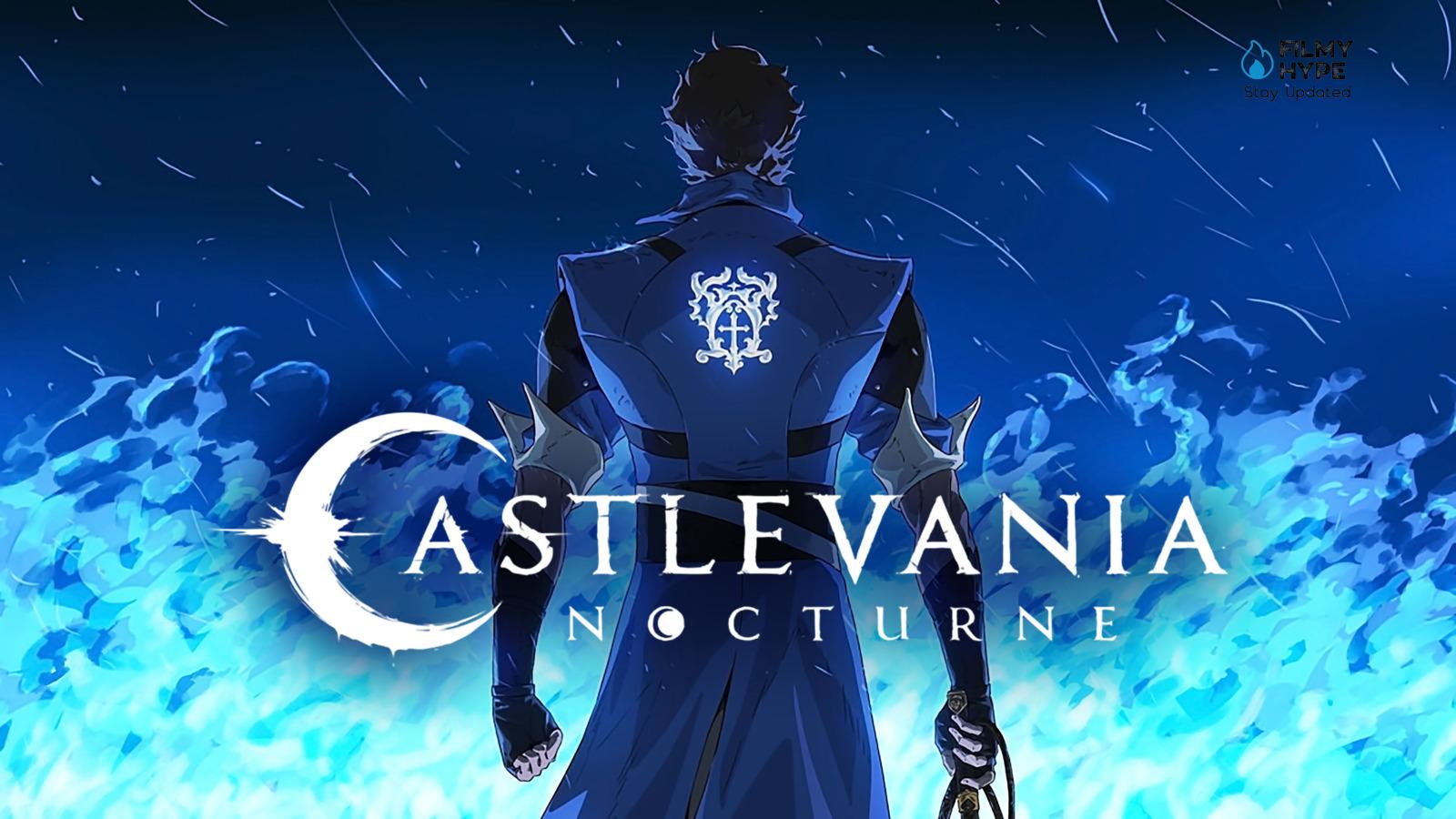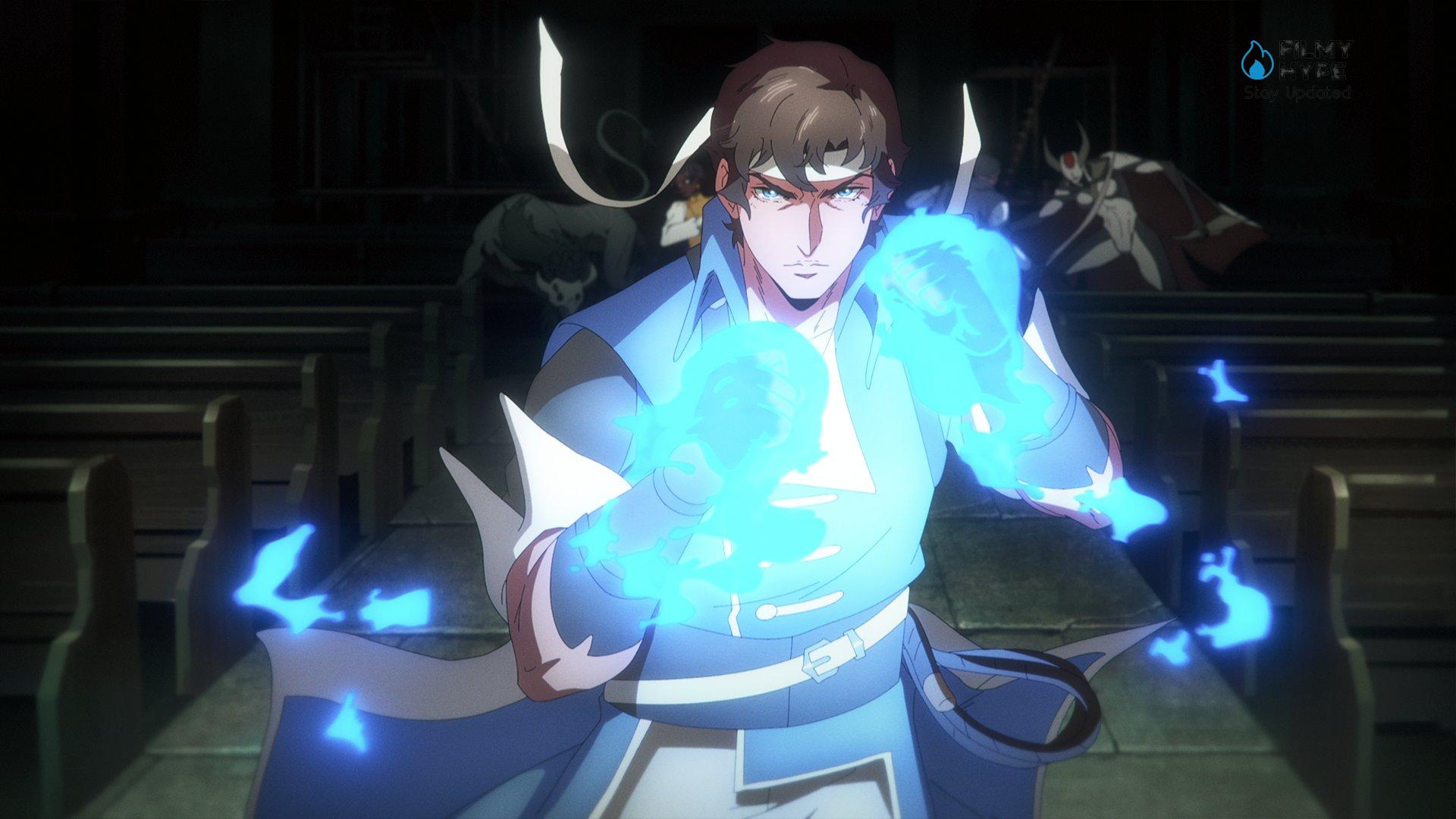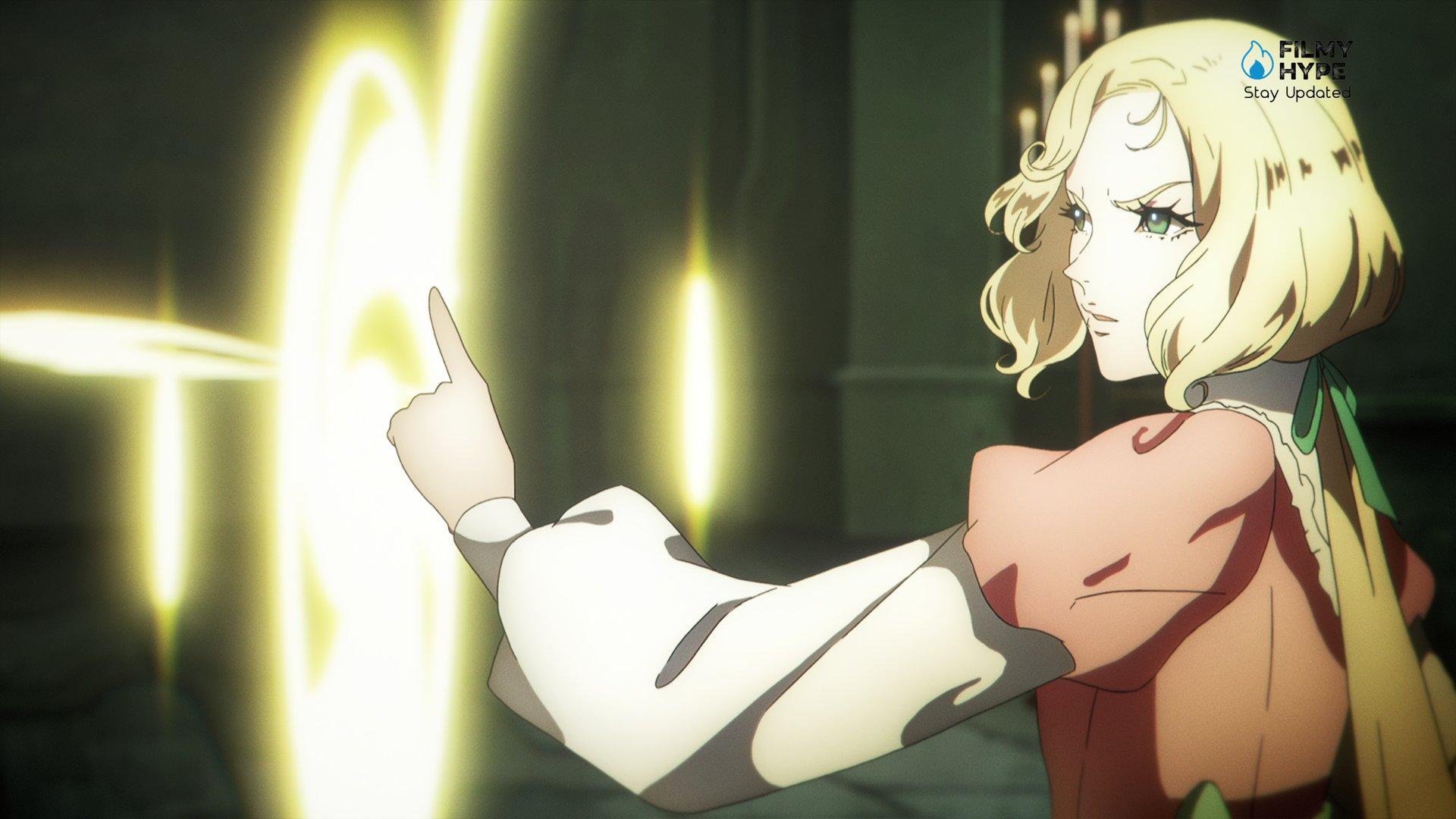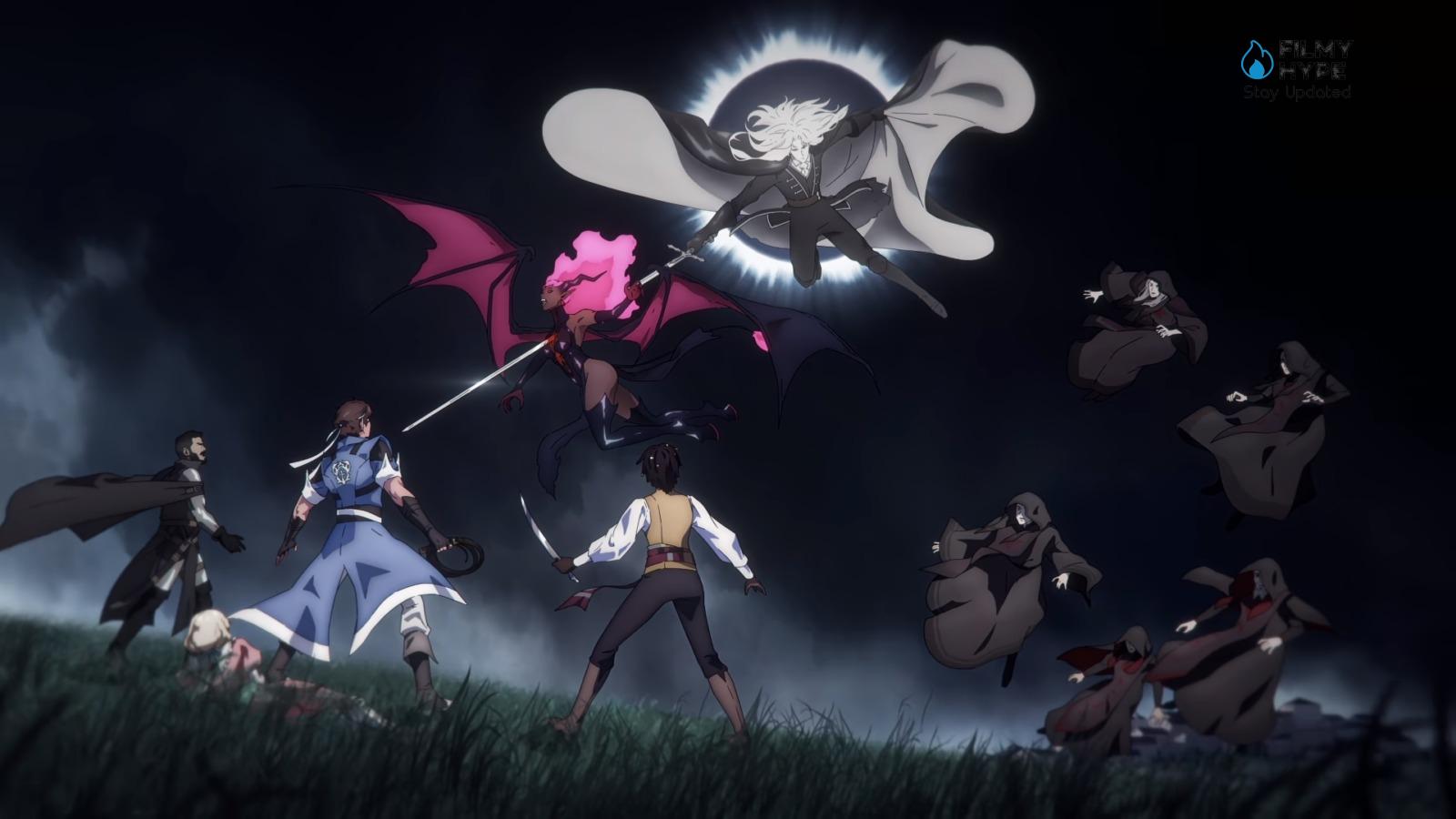Castlevania: Nocturne Review: The Cruelty of Blood and Belmont’s Desire | Netflix Anime Series
Cast: Sophie Skelton, Graham McTavish, Richard Armitage, Emily Swallow, James Callis, Tony Amendola, Alejandra Reynoso, Naoya Uchida
Directors: Adam Deats, Sam Deats
Streaming Platform: Netflix
Filmyhype.com Ratings: 4/5 (four stars)
Castlevania: Nocturne, the spin-off of Castlevania, the famous animation series created by Warren Ellis and based on the Konami video game saga, will be available on Netflix from 28 September. Set during the French Revolution, three centuries after the events narrated in the main series, this new chapter of the saga follows the adventures of the last descendant of Trevor Belmont and Sypha Belnades, Richter. A real sequel that confirms the narrative and stylistic continuity with the original series, giving life to an adventure that reworks the winning formula of the past with some innovations. Created and written by new entry Clive Bradley but again directed by Sam Deats Castlevania: Nocturne is inspired this time by the Rondo of Blood and Symphony of the Night chapters of the videogame franchise. A discreet change of pace maintains the style and themes of the series created by Ellis but adapts them to the new context and new characters.

The result is eight episodes that do not give up the clichés of the genre but go straight to the point, immediate, and direct as only a race against time to avert the Apocalypse can be. The entire Castlevania video game oeuvre has never been alien to the musical world. She always wanted to accompany herself to some symphony, to theatrical arias. Even the moans. This time too it was no different. After four seasons of ups and downs, the new title of the franchise, son of the series created by Konami, is ready to demonstrate to all its audiences, faithful and profane, a new song, made of blood, love, magic, of vampires. A song that manages to shine even in the dark.
Castlevania: Nocturne Review: The Story Plot
France, 1792: the height of the French Revolution. In a remote part of western France, the counter-revolutionary aristocracy has allied with a terrifying Vampire Messiah, who promises to “eat the sun”, and unleash an army of vampires and night creatures to crush the revolution and enslave humanity. Annette, a Caribbean sorceress, seeks out Richter Belmont, the last descendant of the long – and legendary – family of vampire hunters, to lead the resistance. Richter Belmont has lived in France since, as a boy, he lost his mother in America at the hands of the terrible Aztec vampire Olrox. In Europe, however, things don’t seem to be going any better: vampires have mixed up with the French nobility, infesting courts and palaces, and the mysterious disappearances of farmers and commoners are now commonplace.
Richter and the distant relatives with whom he lives, the talker Tera and her daughter Maria Renard, then have no choice but to join the Revolution and become full-fledged vampire hunters. What the three don’t know, however, is that this time the vampires are waiting for a real Messiah, a “Devourer of Light” who promises to deliver the world once and for all to the children of the night. Joining forces with fugitive slaves Annette and Edouard, Richter must prove he lives up to his name and defeat his greatest fear, one of the vampires who killed his mother. Will this be enough to foil the plans of the evil Erzebet Bathory and her bloodthirsty group of acolytes, while, in the background, the revolution rages?
Castlevania: Nocturne Review and Analysis
From the first episode of Castlevania: Nocturne, we witness the tragic events of Richter‘s past that mark him forever, leading him to feel an immense hatred towards vampires and to be ready, trained, and fit to kill one. Richter does everything to be an excellent vampire hunter, as can be seen from his behavior and his care and loyalty towards his house, which can already be seen from his bearing, attention to clothes and weapons, and knowledge of the same. He becomes particularly fond of the powerful Sorceress Maria and her mother as if they were her family. There is no lack of romantic complicity with Maria, and their behavior slightly reminds us of Trevor and Sypha, despite having their own identity that distinguishes them from them.

Maria, a powerful sorceress with Russian origins on her mother’s side, descends from a clan of talkers and is a revolutionary with very clear ideas, losing one of her creatures that she uses through magic to fight, she doesn’t give up, on the contrary, she pushes to do better for his cause and face the looming threat of the “Vampire Messiah”; accompanying Richter in his destiny, tormented by his past and his memories, victim of a post-traumatic shock that haunts him, even avoiding the use of magic since it can also be used by vampires. Castlevania: Nocturne is a pleasure for the eyes, the fluid and brightly colored animations overlap with a dark and horror-tinged story, with plays of light in the most epic moments of the series that highlight the extreme work of the animators and designers.
Like the wonderful fight scenes between the Vampire hunter Richter Belmont and the creatures of the night; a fantastic and luminous shot of Maria at sunset in the second episode, which can also be seen from the trailer, makes us emotional together with the detailed expressions that manage to capture every non-verbal speech that the characters and the story itself want to convey, since the overall work done by the technical animation department is commendable and exceptional. But, another important aspect of the work, in which the latter deals with the same wealth, is the paranormal, spiritual, and mythological part. Of course, in Castlevania: Nocturne, as in the previous series, above all a myriad of vampires is exterminated; but, through Richter‘s story in particular, we explore various cultures like that of Annette, we delve deeper into the environments of the Talkers thanks to the powers that Richter possesses together with his vampire hunter skills, and the presence of Maria.
The latter has a role in the story, as a sorceress, similar to that of Sypha (also with a strong character and an important and appreciated presence), but is characterized and distinguished more, also about the powers with which the protagonist is endowed. Among other things, the appearances of the “Abbot’s soldiers” are also splendid, who are none other than the Templars who serve him. The first scenes of Castlevania: Nocturne gives us moments of pure and bloody adrenaline, we also breathe the “spirit” of revolutionaries like Maria, in the company of Richter, but… we get lost after a few episodes, we follow the plot very well, but slowly; right from the first episodes, after the excellent start, we explore too soon the back-stories of some characters such as Maria’s mother and Annette, who, although fundamental to the story, we would have preferred to postpone to another slightly more distant moment because we would have liked to see especially from the first episodes, more action, a longer screen-time of Richter and company in the fights.

All this only raises our expectations towards this infamous “Vampire Messiah“, and the next battles, but perhaps, our desires will not be satisfied, not these. And you wouldn’t think so, but in Castlevania: Nocturne the Vampire Messiah also wants to free himself from something… His unbridled desire to dominate everyone and shape the world to his liking, and the various carnages, only serve to fill a great void caused by an inferiority complex and the evil that now pervades every cell of his; since, metaphorically speaking, every killing, every bad deed brought him spiritual intoxication. In almost every work, behind the actions of an antagonist, there are hidden reasons that led him to make certain choices, following a different logic, but there are some villains who act evilly like the Vampire Messiah, at least apparently…
Richter Belmont also wants to take revenge, free and save his loved ones and the innocent, but above all… he wants to free himself from the pain and sadness that his soul feels. We notice a parallelism in Castlevania: Nocturne, between what Richter‘s mother said, at the beginning of the first episode, to the little descendant Belmont: ” I had no other choice “, and Maria’s mother repeats the same phrase to the latter, at a given moment. However, the detail of the perfect complicity of Richter and Maria which is expressed in each of their interactions, both the more daily ones of their life and the peaceful moments spent together, and the feeling present even in battle, is so successful that it warms our hearts; a new dynamic, new characters, which however recall in some way the figures of Trevor Belmont and Sypha Belnades. Not to mention the fact that in this new series, we also explore more of the rest of the Belmont family.
As we said above, in Castlevania: Nocturne, the Vampire Messiah acts in a wicked manner only to dominate and dominate, simultaneously satisfying his thirst for blood. But the same goes for Drolta and Olrox, the latter another evil vampire from another faction, who acts for trivial reasons which are also declared to us by himself at the beginning, albeit in broad terms. The only objective that the various antagonists that we will see have in common is to destroy the crowd of the “godless”, for various reasons, which force them to collaborate to obtain the desired objective. In Castlevania: Nocturne, there is a percentage of Horror component that is perhaps even higher than that of the previous seasons, these are human and non-human moments of anxiety that are always present, we are not talking about a simple splatter, because if we really should make a difference, it was found more in past seasons.
Here however, thanks also to the animation of Project 51 and Frederator Studios, we feel the gruesome restlessness not only through the psycho-physical pain of the characters but also and above all, through frames of scenes where darkness, death, and blood mix giving rise to new scenes of terror. But the animation not only makes the horror aspects unique, but also the more peaceful and brightly colored settings, such as the landscapes but also the castles where the nobles (often vampires) spend their evenings waltzing around; in fact, even the melodies that accompany us in the episodes are catchy, and encourage us to follow the plot even more, when these classic musical notes are used in contrast to the cruelty of the fighting. Once again, blood becomes central to the story of Castlevania. Not only in its double meaning of nourishment and lineage but also in the more aristocratic sense of the term.

The vampires in Nocturne are almost indistinguishable from the French aristocracy that hides them. It is precisely from that nobility that they borrow their “class” beliefs, a claimed natural order that would see them at the top not only of the food pyramid but also of the social and political system. A true world of privileged people who become one with the ancien regime itself, a system to be overthrown at all costs, both for revolutionaries and for vampire hunters. Perhaps it is precisely the frankness of these analogies that makes Nocturne an immediately enjoyable and engaging series, decidedly far from the choral structure and Game of Thrones-style plots present in the last – and most scattered – seasons of the original series. A newfound freshness that goes hand in hand with an animation that is not only in continuity with the past (thanks also to the presence of Sam Deats as director), but also in constant evolution, increasingly fluid and finally capable of integrating better with the 3D inserts and with an increasingly imaginative narrative, with successful expressive ideas and convincing character designs.
Between talkers, necromancers, and an end of the world that is always upon us, a story is thus staged which takes up the dynamics of the original series without making a copy of it, revealing itself to be simpler, but also less confusing and dispersive, to the point of creating a classic race against time which is also a coming of age. It is Richter Belmont, after all, who, as in a video game, must unlock his full potential by facing the fears he has carried with him since childhood to finally prove himself worthy of his name. An educational journey that meets History, its political upheavals but also the beliefs and legends that run through it, giving life to a coherent world in which every aspect seems to find its right place. A winning formula, this, which will probably not disappoint old and new fans, is perfectly in line with a successful title which, so far, remains one of the most popular videogame adaptations of recent years.
Castlevania: Nocturne Review: The Last Words
The gift that Castlevania: Nocturne gives us is its ability to distinguish itself from what has already been done, in all the works that concern vampires and the supernatural. We are shown the freedom in all its forms, which we desire, and the imprisonment that haunts each of us. Spiritual sides, revenge in a way that never tires, the desire for peace, which wears out any warrior or hunter who fights for it. In all this there is no shortage of breathtaking fights, antagonists driven by non-sense motivations, but who probably aim for something superior, disturbing atmospheres, and desires. Nocturnal colors, demons moaning, vampires dancing under the moon: Castlevania: Nocturne presents itself in all its dark splendor as one of the best titles in the animated series based on Konami’s iconic titles.






